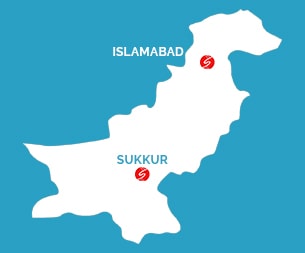The heavy flooding that has struck Pakistan during the past ten days has already affected 2.5 million people and killed over 320. On the strength of an assessment conducted by our teams on the ground, SOLIDARITÉS INTERNATIONAL has decided to intervene.
Water-related diseases are spreading due to a lack of clean drinking water and toilets
Andrea Angioletti, our emergency response team’s Water and Sanitation expert, flew out this weekend to join our team in Punjab, to the north of Sindh, where SOLIDARITÉS INTERNATIONAL intervened following the floods of 2010.
“Because of the floods, which caused water levels to rise, all the hand pumps and reservoirs have been contaminated. In all the villages our team visited as part of the assessment, they found that the majority of water sources had been contaminated, there were no useable toilets and up to 90% of the population were practicing open defecation. In such a context, water-related diseases such as gastroenteritis, diarrhea, dysentery, fever, and scabies thrive. Furthermore, stagnant water attracts mosquitoes, which also carry a variety of diseases.”
Entire villages are still under water
SOLIDARITÉS INTERNATIONAL is preparing to intervene in southern Punjab, one of the five states affected by the flooding. Very few international NGOs are present. Local NGOs do not have the capacity to respond to the emergency without support. “In those villages which are still under water, sanitation infrastructures have been completely destroyed. It’s essential to provide the population with clean drinking water as soon as possible, and to give them access to sanitation: they have been deprived of both for several days. Among other things, we will disinfect wells, repair hand pumps and build latrines.”
Providing concrete, effective solutions for the immediate future
“The rains have also destroyed crops and fields,” explains Andrea Angioletti. “As a result, it’s essential that we take action to ensure that people have access to food. To this end, we’re going to carry out an emergency assessment of the livelihoods of affected families. This will give us a picture of their circumstances before and after the floods – where their income came from, what income sources have been irrevocably lost, how they survive today – and allow us to put in place concrete and effective solutions for the immediate future.”
Photo : © Constance Decorde / SOLIDARITÉS INTERNATIONAL
Pakistan
Context and action- 231.4 million inhabitants in 2021
- 161st out of 191 countries on the Human Development Index
- + THAN 16.000 people helped

